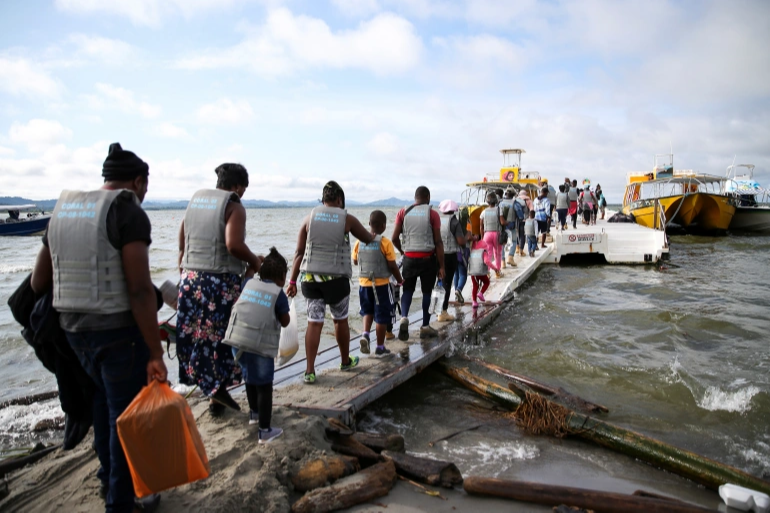
Migrants and refugees board a boat in Necocli, Colombia, a key stop on the journey towards Panama and then the US, in September 2021 [File: Luisa Gonzalez/Reuters]
Bogota, October 14 (RHC)-- Thousands of migrants and refugees are waiting in a town in northwest Colombia for boats to take them across the Gulf of Uraba, from where they will trek through a treacherous jungle on their way to the United States, Colombia’s human rights ombudsman has said.
The group, which Colombian government officials have called a humanitarian crisis, has gathered in Necocli, an obligatory stop in the journey towards the Darien Gap between Colombia and Panama.
“The migration crisis this year is far more serious than last year,” ombudsman Carlos Camargo said on Wednesday, citing the greater number of people attempting to make the journey, as well as their precarious economic condition. He said approximately 9,000 migrants and refugees, most of whom are from Venezuela, are currently in Necocli.
Nearly 7 million refugees and migrants have left Venezuela in recent years amid a worsening security and socioeconomic crisis in the South American country. Many fled to neighbouring Colombia, which last year announced plans to grant temporary protection to about one million Venezuelan asylum seekers, allowing them to work legally and better integrate into the country.
But in recent months, many Venezuelan refugees and migrants have attempted to reach the U.S. through the Darien Gap, a mountainous jungle passage between Colombia and Panama, where they face threats of violence and other harsh conditions.
Panama’s National Migration Service said earlier this week that 151,582 migrants and refugees had made the crossing between January and September — a record that surpassed the 133,726 crossings recorded for all of 2021. This year’s figure included approximately 21,570 minors.
“There has already been an unprecedented number of Venezuelans who have put their lives at risk by crossing the dense jungle between Central and South America,” Giuseppe Loprete, head of the International Organization for Migration (IOM) mission in Panama, told the Reuters news agency.
Venezuelans recently surpassed Guatemalans and Hondurans to become the second-largest nationality stopped at the U.S. border after Mexicans. In August, Venezuelans were stopped 25,349 times, up 43 percent from 17,652 in July and four times the 6,301 encounters in August 2021.
Meanwhile, IOM and the United Nations Refugee Agency (UNHCR) said earlier on Wednesday that approximately 4.3 million refugees and migrants from Venezuela lacked access to food, housing, and stable employment in Latin America and the Caribbean.
The groups said surging costs of living, high unemployment rates and the fallout from the COVID-19 pandemic have made it more difficult for Venezuelans to integrate into host communities across the region. Half of all the refugees and migrants cannot afford three meals per day, the organisations said, while many have been forced to resort to “sex, begging or indebtedness” to survive.
“As the world faces numerous humanitarian crises, Venezuelans and their host communities must not be forgotten,” Eduardo Stein, the joint special representative at UNHCR and IOM for refugees and migrants from Venezuela, said in a statement. The European Union has announced it would provide Colombia with $33 million in humanitarian aid, a large portion of which will go towards those affected by Venezuela’s crisis.
Colombia’s Vice President Francia Marquez also acknowledged the “complex situation” regarding migrants and refugees looking to cross the Darien Gap during a press conference with Janez Lenarcic, the EU’s crisis management commissioner.

